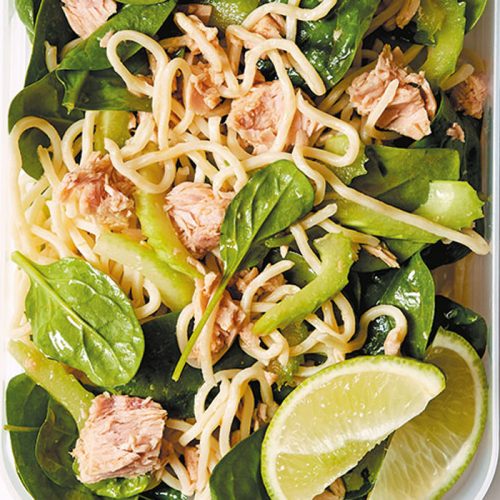
A slow metabolism is often blamed when we struggle to keep our weight within a healthy range. HFG looks at the myths and facts around metabolism and weight management and finds the science-backed ways to speed it up.
Struggling to manage your weight? You might be feeling you’re doing everything right — eating what your body needs, moving more — but unwanted weight remains. Could a slow metabolism be conspiring against you? And if it is, what can you do to speed it up?
What is metabolism?
What most people actually mean when they talk about metabolism as it relates to weight is their ‘metabolic rate’ — the amount of energy that the body uses each day. The biggest component of this is your basal metabolic rate (BMR), which is the amount of calories (energy) your body burns at rest. Sixty to 80 per cent of your daily energy is spent this way on functions such as breathing, keeping your heart beating, your blood circulating, and repairing cells. You spend your remaining daily energy on physical activity (10–30 per cent), and about 10 per cent on digesting food.
Body size and composition, age, gender and genetics can all affect BMR, and account for the variation in resting metabolic rate between different people. The amount of muscle you have is the biggest contributor to your BMR. This is one reason why men typically find it easier to manage weight than women.
6 of the most common myths about metabolism
Myth 1 Metabolism slows down at menopause
Fact Maybe, however it’s more to do with the age at which menopause occurs — about 51 on average — and the fact that menopause changes where fat is typically stored.
Age-related weight gain is real, often due to loss of muscle mass, which ramps up after the age of 50.
Most people also reduce their physical activity levels as they age. Because muscle is hungry for fuel, the less you have, the less energy your body burns.
The good news is that age-related muscle loss can be slowed or avoided. Resistance training exercises such as yoga, Pilates or weights can help you retain or build muscle mass.
Myth 2 Eating 5–6 smaller meals a day boosts metabolism
Fact While eating regularly can help you avoid becoming overly hungry and overeating, meal frequency doesn’t affect metabolism.
One UK study found that regardless of whether people consumed their daily kilojoules across two or five meals, their metabolic rates remained the same, burning the same amount of energy over 24 hours.
Myth 3 People who are overweight have slower metabolisms
Fact Actually, the opposite is true. People with larger bodies need more energy to carry out basic functions. Research shows that people who are overweight have faster metabolisms — or metabolic rates — than people who weigh less.
Myth 5 A slow metabolism can make it harder to lose weight
Fact Probably not. Having a slow metabolism is rare, usually due to an underactive thyroid.
While a ‘faster’ metabolism means your body uses fuel more quickly, someone with a ‘fast’ metabolism can still gain weight if they consume more calories than their body needs.
Research shows most of us underestimate just how much we eat and drink across the course of a week.
We are also good at overestimating how active we are throughout the day, and how much energy we burn when exercising. Weight control is part genetics, but also heavily influenced by environment.
Myth 6 Eating more protein boosts metabolism
Fact Not significantly. Protein takes longer for the body to burn, so it does have a higher thermic effect than carbohydrates or fat, which means it increases your metabolic rate immediately after a meal.
However, this effect, called thermogenesis, contributes only a tiny amount to the energy your body burns each day.
Bottom line…
Many factors determine how many calories your body burns each day. Some you can’t change, like your genes, gender, how tall you are, and your age. What you can do something about includes your food choices, level of activity, and taking up resistance training to prevent muscle loss and to maintain your metabolism long term.
How do you support your metabolism and still lose weight?
Don’t use drastic measures like reducing calories to around 1000 calories or less a day. When this happens, your body thinks there’s a shortage of food and it responds by conserving energy, slowing your metabolism and weight loss efforts. And if your body does lose weight, it is also more likely to shed just as much muscle as fat. We suggest you quit the crash diets and try these strategies instead!
1 Make small changes to your diet
Rather than attempting large changes that are difficult to maintain and leave you feeling like you’re depriving yourself, research shows making small, healthy changes to your eating habits — and sticking with them — leads to long-term weight loss.
2 Put enough protein on your plate
Protein is necessary to maintain metabolism-friendly muscle mass. Try to make one quarter of your meal protein, accompanied by one quarter low–GI carbohydrates — and plenty of healthy vegetables of every colour.
3 Write what you bite
A 2019 study confirmed the value of keeping a food diary for weight loss. You don’t have to spend a lot of time filling it in each day for it to work, but you’ll get better results if you log what you eat after every meal, rather than leave it all to memory at the end of the day.
4 Do some resistance exercise
This is essential to boost muscle mass. Muscle is often lost during weight loss, but muscles kilojoule-hungry tissue helps to keep your BMR ticking along at a good rate.
Although tweaking your diet will deliver better initial weight-loss results than exercise, regular aerobic exercise counts more when you are trying to keep the weight from returning.
5 Get a good night’s sleep
Research shows that a bad nights sleep can make you feel hungrier. Sleep consistency —getting roughly the same number of hours sleep each night — can also influence weight loss.
A 2019 study found that people who got between seven and nine hours of sleep every night lost more weight than those whose sleep patterns were less consistent. This occurred even though both groups were following the same eating plan, and had the same overall amount of sleep.
For more about your metabolism try these articles:
How can I boost my metabolism?
The truth about your metabolism
Article sources and references
- American Psychological Association. 2018. Why do dieters regain weight?https://www.apa.org/science/about/psa/2018/05/calorie-deprivation#:~:text=The%20real%20question%20is%20why,when%20they%20lost%20the%20weight.
- WebMD. 2016. How your appetite can sabotage weight loss. Accessed June 2020https://www.webmd.com/diet/news/20161014/how-your-appetite-can-sabotage-weight-loss#1
- Polidori et al. 2016. How strongly does appetite counter weight loss? Quantification of the feedback control of human energy intake.https://www.ncbi.nlm.nih.gov/pmc/articles/PMC5108589/
- Harvard Medical School. 2018. The truth about metabolism.https://www.health.harvard.edu/staying-healthy/the-truth-about-metabolism
- Better Health Channel. Metabolism. Accessed June 2020https://www.betterhealth.vic.gov.au/health/conditionsandtreatments/metabolism#:~:text=Metabolism%20refers%20to%20all%20the,build%20and%20repair%20our%20body.
- ScienceDaily. 2016. Yo-yo dieting might cause extra weight gain. Accessed June 2020https://www.sciencedaily.com/releases/2016/12/161205113908.htm#:~:text=Summary%3A,future%20shortages%2C%20new%20research%20suggests.
- ScienceDaily. 2018. Weight cycling is associated with a higher risk of death. Accessed June 2020.https://www.sciencedaily.com/releases/2018/11/181129153837.htm#:~:text=Summary%3A-,Weight%20cycling%20is%20associated%20with%20a%20higher%20risk%20of%20death,Journal%20of%20Clinical%20Endocrinology%20%26%20Metabolism.
- The University of Sydney. 2019. Simple tips for weight loss that don’t include fad dietshttps://www.sydney.edu.au/medicine-health/news-and-events/2019/02/20/5-ways-to-lose-weight-and-keep-it-off-without-fad-diets.html
- CSIRO. 2018. Ditch junk protein foods for healthy weight losshttps://www.csiro.au/en/News/News-releases/2018/Ditch-junk-protein-foods-for-healthy-weight-loss
- Smith GI et al. 2016. High-protein intake during weight loss therapy eliminates the weight loss induced improvement in insulin action in obese postmenopausal women.https://www.ncbi.nlm.nih.gov/pmc/articles/PMC5113728/
www.healthyfood.com
















